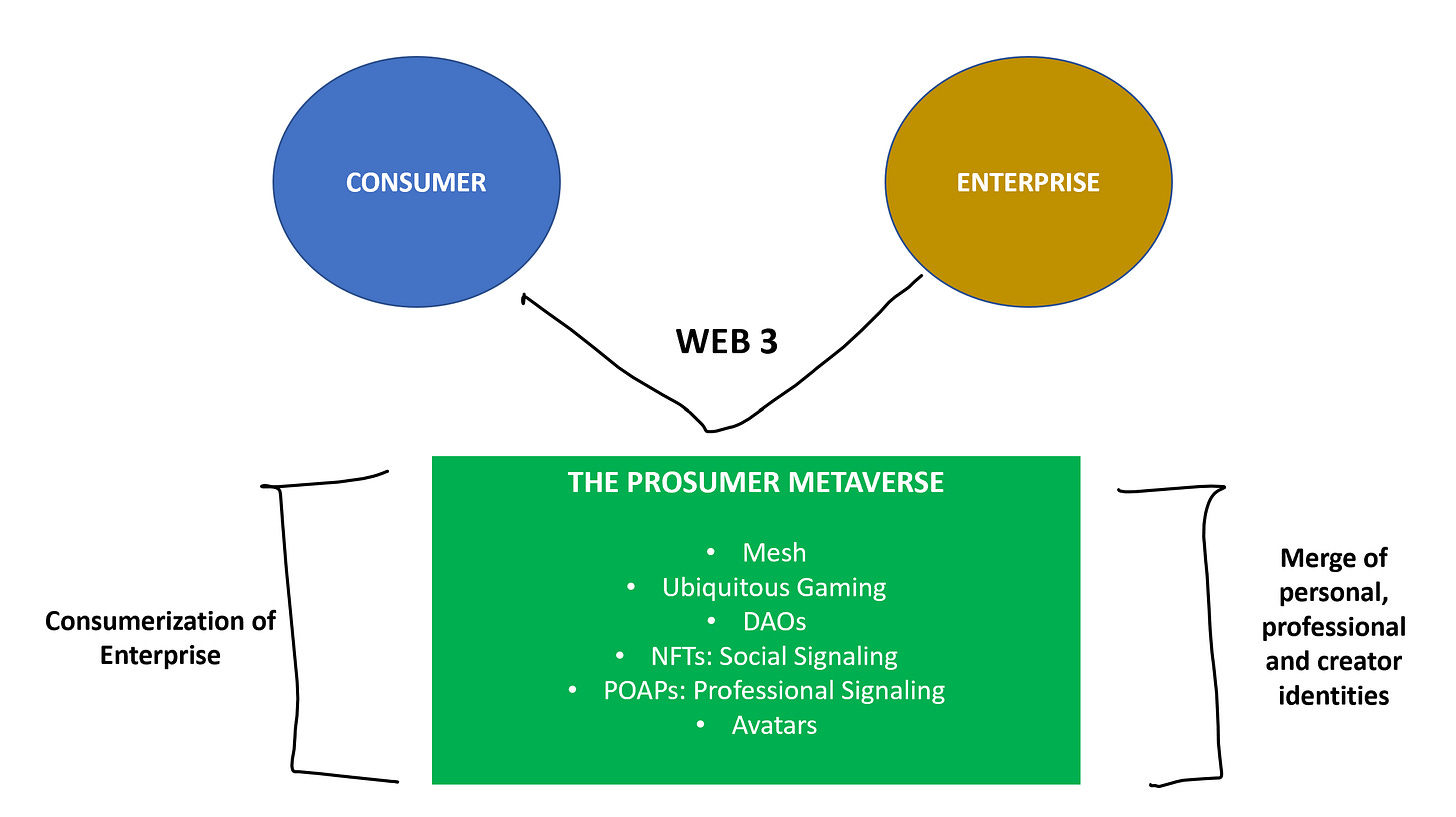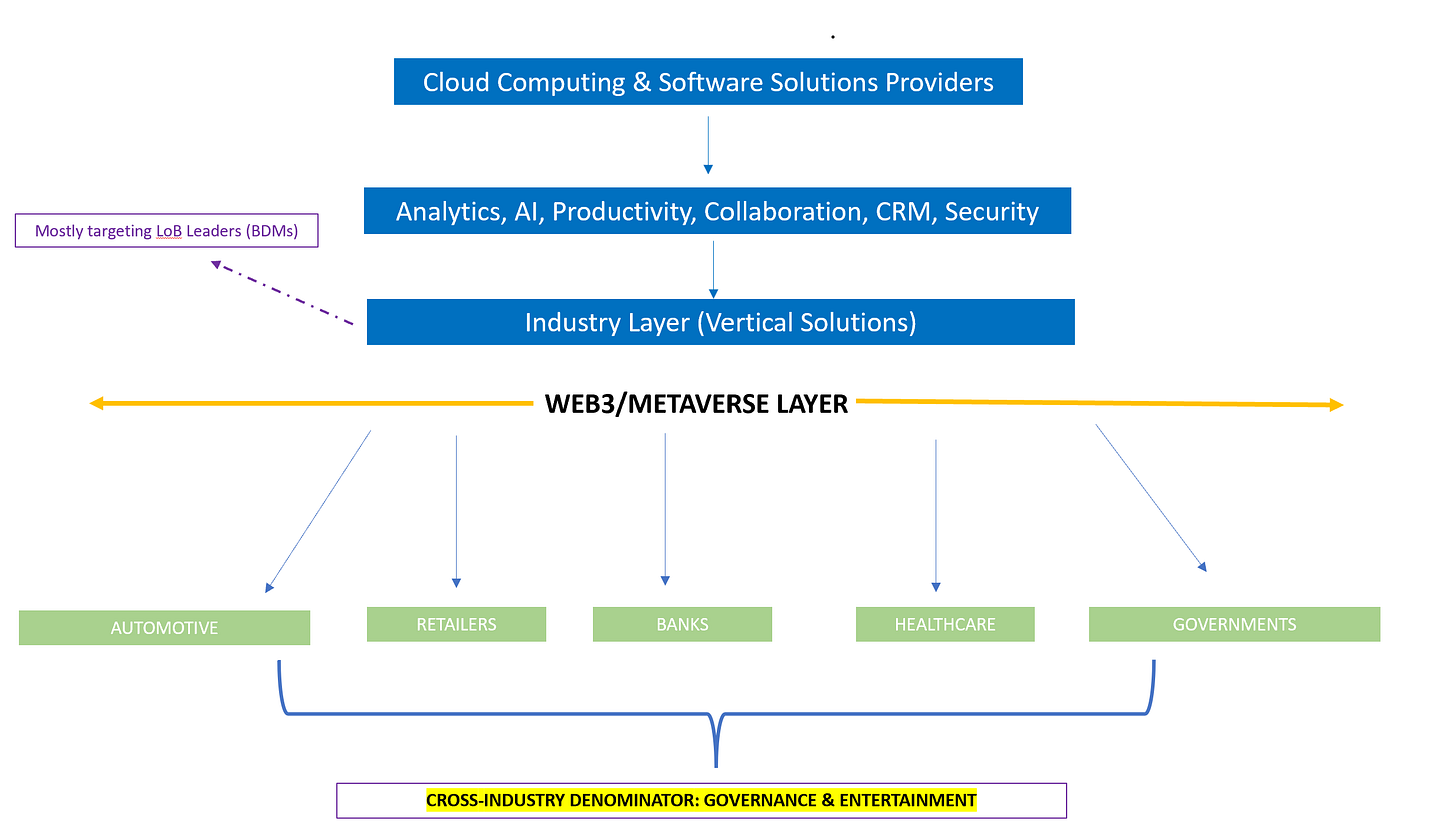Mind Crunches #15: Enterprise + Web3: Governance and Entertainment as a Service
Alternatively: Why the Prosumer Metaverse will be an egalitarian La La Land
(This is a post that will double-click on blockchain and web3 technologies and frameworks. In case you are still catching up with these terms, I highly recommend you reading my earlier posts on Crypto and The Metaverse)
This is what I was writing 16 months ago about the emerging trends in Enterprise:
The lines between industries are becoming blurry. The days where a retail, a banking and a healthcare organization had totally different operating and business models are long gone. We are now witnessing how advanced technologies (AI, IoT, blockchain, 5G) empower a new breed of fluid organizations. Retail, banking, healthcare, telecommunications, entertainment, mobility will soon merge forming a single platform of experiences.
Experiences will be the single currency between companies and customers!
I find that my analysis still stands today but there is one word I would change if I wrote this again. I would replace the word “experience” with “collaborative entertainment”. Experiences will still be the single currency but they will be redefined to be community-led and carry a layer of entertainment and status signaling.
On December 2020, crypto was cool and trendy but almost nobody talked -seriously- about web3 and metaverses. Facebook still hadn’t evolved into Meta, Satya Nadella didn’t openly talk about the enterprise metaverse, Matthew Ball wasn’t ready to publish a new book on Metaverse and web3 was a term used only for signaling purposes by laser-eyed avatars.
During those 16 months since I wrote this, we haven’t witnessed a new revolutionary technology or platform that has made the Metaverse “tangible” so it is fair to say that we are still pretty far from a real Metaverse. What has changed is the social perception of the Metaverse, the normalization of the term, the -unofficial- consensus among Big Tech leaders that this is the next best thing, some cool consumer brands that are launching NFTs and they dress them up as Metaverse and the -unfortunate but predictable- noise that comes with every new tech buzzword.
In the past, we have seen both cases where:
the masses were ready for a new technology but we were lacking the infrastructure/technology/devices (e.g. Virtual Reality)
the technology was mature enough for mass adoption but the masses weren’t ready (e.g. AI use cases, green technologies)
Web3 seems to be somewhere in the middle but it’s an “industry” that is accelerating super fast both in consumer and enterprise level. I know that we tend to treat those 2 differently using archaic and currently meaningless terms like B2C and B2B, where in reality everything is H2H (Human to Human), but the past years they have very close (consumerization of enterprise is an example) and I believe that web3 will accelerate this trend merging them into a *single Metaverse of Prosumers where communities and entertainment will dominate.
Before I jump into my Governance & Entertainment as a Service thesis, let’s first see for a moment why Web3 seems to be the logical evolution of Cloud Computing.
* I also believe that there will be a somehow separate Metaverse not connected to the Prosumer one which I will call the Industrial Metaverse. This will mainly be an ecosystem of Digital Twins, industrial IoT and digital manufacturing plants.
The “No Cloud” Era
Web3 seems to combine the advantages of the open internet (web1) and the power of cloud applications and platforms (web2). Someone could even argue that we transition to a “No Cloud” phase exactly like Benioff declared the last 2010s as the “No Software” era.
Cloud computing was -and still is- a fundamentally new way of creating and providing software that does not have much in common with the old on-premise way of doing software. Examples of innovations of this new delivery model are the emergence of DevOps, customer success teams and recurring subscription pricing.
It is also true that the cloud computing market is centralized among a few Big Tech players and some unicorns and as a result cloud providers are currently not perceived as “suppliers” but as platform owners who many times compete with their own customers (I am still super proud of the fact that Microsoft has repeatedly announced that we won’t be competing with our customers)
It still remains unanswered if the open blockchains will prevail but the decentralized nature of web3 promises a more pluralistic and diverse ecosystem of players and provides a fundamental base for economical innovation to prosper. Solid use cases like like zero knowledge proofs, private transactions and private smart contracts, compute-to-data and federated learning are the foundation for enterprise web3 adoption and usage and they can also be the catalyst for future use cases that are not possible in the web2 cloud.
One family of such use cases are on governance and collaborative decision making. Decentralized governance aims to involve more people, agents and stakeholders in a better way which in complete contrast to centralized or hierarchical governance in enterprises and organizations.
Governance as a Service
Traditional governance models, like public corporations, have a very strong focus on the needs of owners and shareholders. Represented by the so-called shareholder value which follows the primary goal to grow the wealth of shareholders. That leads to misalignment, short-termism, disengaged employees and customers and an underrepresented focus of the needs of the public. Needs like sustainability are much lower priority and the acceptance of negative externalities is usual — while at the same time being “compliant” is possible.
Therefore, Decentralised Autonomous Organizations (DAOs) could be the solution to a more aligned and fair distribution of power leveraging the capabilities of blockchain-based governance and decision making. Imagine hierarchy-free organizations of members working towards a common goal based on shared values and decision making implemented via token-powered votes. Token distribution can include anybody from any stakeholder group.
DAOs are especially well positioned to govern platforms and form ecosystems and consortiums assuming a fair mechanism of governance tokens and they could revolutionize both how corporations are managed but also breed a new set of enterprise solutions and use cases.
Aragon, *a non-profit association promoting DAOs and blockchain governance solutions, is a great example of a new type of enterprise services providers focusing on voting, dispute resolution and members’ engagement. The same way that right now Zoom, Slack and other SaaS players are offering collaboration and productivity tools, web3 enterprise startups could offer DAO and Governance tools. Moreover, new types of business models (what I call “skin in the game” transactions) could emerge based on the idea of provable on-chain business results being rewarded with soulbound NFTs vs subscription dollars.
DAOs, enhanced with quadratic voting mechanisms, could be a dominant community structure in the Metaverse empowering individuals to collaborate (rather than compete) and have a voice in the decision making of their favorite communities. I don’t expect shareholder-led corporations to become obsolete (and I don’t think this would be good) but I expect a resurgence of collaborative-led communities governed by egalitarian blockchain mechanisms.
*Disclaimer: I am an Aragon ambassador
Entertainment as a Service
Sometimes it's hard to remember that the public cloud still represents a very small percentage of overall IT spending: Cloud services only made up 9.1% of the entire global information technology market in 2020, according to Gartner. At the same time, most companies have come to terms with the need to modernize their digital infrastructure but they want to follow a different path compared to the earliest cloud adopters.
The Horizontal Strategy
For example early cloud customers had a strong interest in mixing and matching individual cloud services to build infrastructure themselves. This is how the “traditional” enterprise software commercial strategy looked like (and still does in many cases) :
The (Cross) Industry Strategy → Experience as a Service
New entrants to cloud services ecosystem are looking for help putting together the basic building blocks needed to run a modern internet business, preferring to focus on building custom touches on top of the cloud industry's heavy lifting. This is where the cloud providers found a great market opportunity to build an industry-specific approach to cloud offering vertical solutions targeting separate C-level executives and LoB leaders. Having witnessed the evolution of Microsoft (and other major competitors) Industry strategy first-hand, it has become clear that the big Cloud providers will -and should- not go 100% vertical because this would require years of technology innovation and development of specialized knowledge and would also kill the business of their Partners. So the right commercial formula is to be “vertical enough” to be able to understand the unique problems of their customers and identify cross-industry patterns to group solutions into bundles. I firmly believe that the current dominant pattern is “Experiences”. Use cases like:
Personalized Marketing
Next Best Action
New Employee Onboarding
Patient Care
Citizen Engagement
belong to different verticals but share the same DNA of “Experiences”.
Let’s take the example of a big Retailer like Walmart. It’s a dominant retailer with thousands of stores, very complex supply chain operations producing its own white-label products, currently offering same-day delivery services and personalized “banking” products that help customers buy more. I can also safely predict that in the near future Walmart will partner with healthcare and wellness providers that will customize your shopping list based on your personal medical history.
In which Industry does Walmart belong? What kind of vertical solutions can you offer to their needs? The answer is: Experience solutions with an Industry veneer.
The Web3 (Cross) Industry Strategy → Prosumer Metaverse
As we will transition to a Web3 Enterprise model, I predict that the new cross-industry pattern will be around "Governance” (as explained above) and “Entertainment”. We will witness multiple use cases focusing on:
Fans tokens
Community engagement
Gaming environments
Avatars
Status Signaling
All these use cases will live in one single “Prosumer Metaverse”. As I had written in my previous blogpost:
"Microsoft is currently the best positioned company to lead the Metaverse. The main reason behind this is that Covid has completely reshaped how we work and how we define “work”. Covid not only decoupled location and employment but also accelerated the development of the “creator economy”. In the post-Covid world, the boundaries of when we work and use the Internet for personal entertainment/creativity are practically non-existent. Knowledge workers and creators will be the first and heaviest users of VR shifting productivity, commerce and communities to virtual environments. Enterprise, consumer and creator businesses will merge into a new form of economy that will be powered by VR and the most well-suited and interoperable platform to host this new paradigm is Teams. (Ben Thompson has a great post on that)
Think for a moment your average working day. You use Zoom/Teams/Slack for both personal and professional calls, you don’t have a fixed work schedule which means that while you are working you can also upload your new handcrafted vase to Etsy or you may be sharing some ideas to your favorite DAO on Discord. Or if you are more hip, you may attend a company meeting on Gather using your latest NFT as an avatar.
I can keep going on with more examples (I didn’t even comment on gaming environments and universes like Fortnite) but you get the idea of how consumer, professional and creator identities blend together. So coming back to the Walmart example, Walmart in the near future will have stores in the Metaverse, holders of its cryptocoin will have access to the Walmart DAO where they will vote on how the company is governed and loyal customers will be airdropped tokens that can redeem in a virtual concert.
In which Industry does Walmart belong? What kind of vertical solutions can you offer to their needs? The answer is: Community-led experiences with an Entertainment veneer.
I visualize the trends and dominant forces in a simple model like this:
which means that the Web3 Enterprise GTM strategies will look somehow like that:
I am very interested to see how these market trends and dynamics will evolve and what kind of business models will emerge. I am still bullish on Microsoft being a dominant player on the Metaverse with Teams and Xbox acting as gateways to new universes and with some strategic investments -hopefully- placing the company at the center of web3 innovation.
I’ll see you on other side!
Mind Crunches
Why buildings keep getting uglier. Bonus assorted read: Tartaria’s conspiracy theory.
Local governments going crypto.
Glen Weyl’s manifesto on Pluralism. Highly recommended!
Frogs can now regenerate their amputated legs. Bonus: Levin is the most fascinating scientist on anatomical/regeneration studies.
The great Ben Thompson on the current status of Digital Advertising.
AI + Biomimicry + Ornithology. Bonus: Nature is the most brilliant engineer.
Bryan Caplan’s new blog. (Caplan is one of the most original -in the original sense of the word- thinkers out there)
We don’t need a Metaverse. We need a Pluriverse.
Maryland State jobs won’t require college degrees anymore. I am in favor of all decisions that promote equity and eliminate credentialism. But we also need to * seriously * talk about how we “measure” experience. Thoughts on that.
This HBR article on B2B marketing has made me so angry with how misinformed it is that my next Substack post will be dedicated on how I see the evolution of Marketing/GTM/PLG/Sales/Enablement strategies in Consumer/SaaS/Enterprise. Stay tuned!
Best Web3 twitter threads!
The past year, I have become a huge fan of ADUs (Accessory Dwelling Unit). It is hands down the “technology” with the biggest potential to alleviate America’s homelessness problem in a fast, environmental and innovative way. Sad news is that powerful local interests block ADU policy bills :(
Noah Smith on how to better study and speed up Progress. Highly recommended!
10 industries being disrupted by DAOs
Charter Cities Institute new research agenda.
Matthew Yglesias on whether the misinformation narrative is a myth.
Quadrupedal robots become (much) better at moving around!
Truly creative NFT Projects → CAR by Shloms
New infoporn obsession: Commonplace. Analysis, research, reviews and applied theories on knowledge management.
Project Ithaca: AI to restore ancient texts.
Crypto, Culture & Society is the most exciting DAO out there rethinking education.
Interesting web project on how to move from Information to Wisdom.
Why we stopped making Einsteins. Short answer: modern education sucks.
Recommended Podcast: David Rubenstein talks to Ken Burns
Recommended Newsletter: Immersion (all things Web3)
Recommended Book: 2034 by James Stavridis
Recommended Movie: “The Network” - A 1976 film with the most accurate predictions for 2022. Excellent!
Quote of the month: “Only the dead have seen the end of the war" Plato
Photo of the month








